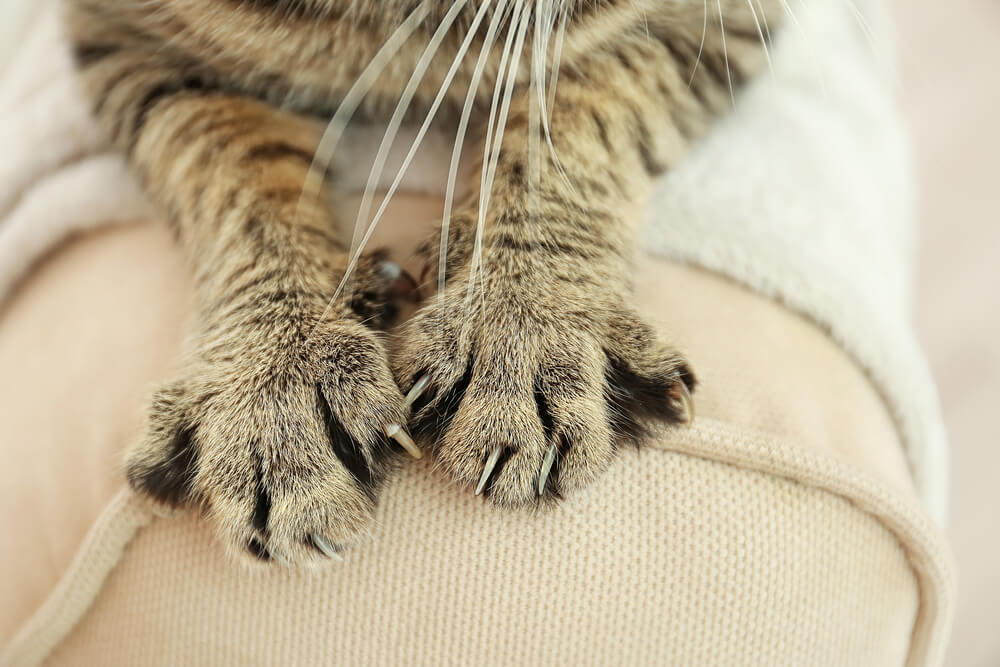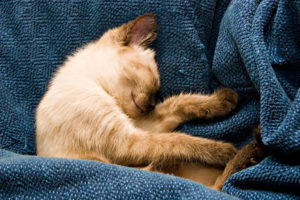1. Spend more time with your cat. Cats are extremely social creatures who need attention from their loved ones in order to be happy and content. If you spend less time at home, then it will be harder for your cat to stop scratching the furniture because he would rather play with his favorite toy (you) than scratch the couch.
2. Provide appropriate alternatives like scratching posts, cardboard scratch pads, or sisal rope mats to substitute the act of scratching on your expensive sofa or curtains. Read up on how to make a suitable scratcher here or buy one here.
3. Be patient and understanding; punishing your cat for scratching will only make him afraid of you. And remember to praise his good behavior!
4. Visit the veterinarian regularly to ensure that your cat does not have any health or pain problems that can cause him to scratch excessively (e.g. arthritis). Sometimes cats need medication to help their itching, so do not hesitate to bring your kitty in for a checkup every once in a while if the problem persists.
5. If you are letting your feline friend outdoors, then keep an eye out for wild animals like raccoons or birds who may be attacking the bird feeder just outside your window. This can cause anxiety which leads to loss of appetite and trouble sleeping.
3. Some cats enjoy licking carpets when they are stressed out, so provide several soft towels around the house if this is what’s triggering your cat’s destructive behavior when you leave for work in the morning.
4. To stop a cat from scratching furniture, cut the chosen object’s tip to shorten its height and lessen its appeal as an alternative spot for your cat to scratch on.
5. If you can’t catch your cat in the act, spray her with water whenever you see him near the couch with his claws out or whenever she has just finished scratching on your curtains or rugs. Make sure that he is punished for any bad behavior by consistently applying this technique until she gets the idea.
6. Apply soft pungent sprays like citrus scents, vinegar, or vanilla extract onto surfaces where your cat would normally scratch to make these areas smell less appealing to him/her so they will instead go back onto using the scratching posts you bought him/her.
7. If potentially destructive behaviors are triggered by stress, then your cat would likely relax and feel more comfortable when they have a safe place to retreat to with a window or cat tree in the corner of a room where sunlight streams in through the windows so he can look outside at his kingdom from this perch.
Why is my cat suddenly licking furniture?
There are a few possible reasons as to why your cat suddenly starts licking furniture:
1. Some cats need stress relief and like to lick objects, especially soft things like carpets or cushions, because this is soothing and calming for them.
2. Your cat may be getting ready to groom himself, but this time he chose to lick the floor or the sofa to substitute his own body as usual. So if you find your cat licking household objects frequently, then this won’t necessarily be a cause for concern.
3. When cats turn their tongue into a brush, they may be signaling that they are stressed and anxious, which might indicate that changes need to be made in terms of their lifestyle (e.g., reassess your cat’s feeding schedule to ensure that he/she is getting enough nutrition).
4. Some cats can be obsessive-compulsive and behave in this fashion due to a disorder of the mind, similar to how humans with OCD perform repetitive actions over and over again without being aware of their own behavior. This is called feline hyperesthesia, and it may be displayed in the form of licking household surfaces.
5. If your cat licks you, there is a reason for this; he/she loves you and wants to get close to you (i.e., show affection), so if they do this to other things like carpets, then you can conclude that they have a very special relationship with those objects as well.
6. If you provide your cat with high-quality food, he/she will likely be more satisfied and won’t feel the need to lick household items as much, so try switching brands if this is indeed the case for your feline friend.
7. Some cats have what one might call “bizarre personalities,” and one way to tell is if your cat licks objects which other cats wouldn’t, such as the floor instead of you.
8. If your houseplants often wilt even after you water them, then this could be due to chronic stress so try moving them around and providing them with enough sunlight and fresh air to help them grow better.
Why does my cat attack my feet at night?
Cats are natural predators who must hunt for their food in the wild, which is why they like chasing moving objects around; it triggers their hunting instincts and makes them feel alive (almost like they are “one of us”). So make sure your cat gets enough exercise by playing with him/her more often.
Even though cats are natural predators, they may still show affection for their owners by licking them or approaching them at night time to sit on your feet (or toes); this is because they like getting attention from you (or other members of the family) so praise your cat for this behavior and give him/her some treats.
Is a new scratching post is a good solution?
Yes, it is! There are many different types of scratching posts you can buy or make at home (e.g., cardboard, sisal rope), and your cat will likely love the new surface because there are so many different textures for him/her to explore.
Please note that if your cat scratches upholstery or furniture, then you should probably buy a scratching post with carpet on it, which is very similar to the material in your sofa.
Is it good for the cat’s claws?
Yes, it is! If your house has lots of windows or mirrors, then a scratching post can help them keep their claws nice and sharp by giving them a good scratch on a regular basis instead of ruining the furniture.
Do all cats scratch the furniture?
Yes, they do. Cats like to scratch both wooden and carpeted surfaces (and anything in between, such as vinyl flooring) because it provides them with a good stretch and keeps the claws healthy; if your cat likes scratching soft surfaces, then don’t buy him/her a scratching post made from cardboard or sisal rope because it hurts their paws when they use it.
What about declawing cats?
Declawing is the amputation of the claw and the first two bones on her toes. It is generally performed on cats to prevent them from scratching furniture, people, or other animals. There are mixed opinions about declawing cats. Some say it is an ethically unacceptable act of animal cruelty, while others say it prevents damage to furniture.
There are many organizations that speak out against declawing cats. One of these organizations includes PETA (People for the Ethical Treatment of Animals). They believe that this act is cruel to animals and should not be considered as an alternative to using a scratching post. The reason behind this belief is because declawing takes away a cat’s ability to defend itself if another animal attacks them. Another reason they oppose this act is that it can be very painful for cats, and there are many risks involved in the surgery.
Many veterinarians feel that declawing should only be performed on cats with behavior problems due to destructive scratching or when all other methods (such as training, use of the scratching post, wrapping the claws, etc.) have not worked.





